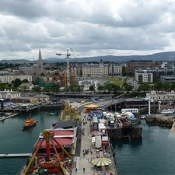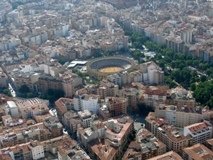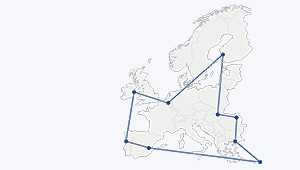
The SURE network is a space for learning and exchange, structured around core themes such as tourism, enterprise, physical improvements, strategy, and community. SURE is designed to support officers and politicians from municipalities in working hand in hand with their counterparts of other towns to explore whether there are better or different ways of tackling the commonly shared problems.
- Tourism as a way of facilitating local economic and cultural development;
- Encouraging small enterprise and innovation;
- Physical improvements to important buildings and open spaces;
- Strategic partnership and planning to regenerate housing markets, re-use land and buildings and manage town centres; and
- Community development to build confidence, tackle prejudice and engage both young and older people in meaningful activity and dialogue.
In addition, SURE network provides an important contribution for every city partner in the field of participatory planning as a cross-cutting theme. This is because the active engagement of local citizens is considered to be central to the development of
The main output of the SURE network will be the integrated Socio-economic Urban Rehabilitation model, which is based on the experience of SURE partners and best practices and designed to provide guidance for other practitioners who intend to develop similar strategies for their own towns and cities. This will be complemented by a toolkit on participatory approaches towards planning and strategy development in deprived neighborhoods. The SURE model will be disseminated in national languages in the frame of publication of booklets. It will be prepared with the help of the Lead Expert for the final conference, together with policy recommendations and a best practice collection.
In line with the URBACT II principles, each partner has to make a Local Action Plan (LAP), which must be based on the lesson learnt during the exchange and learning activities of the project, and Local Support Groups (LSG) has a central role in the design and implementation of the LAPs. The heart of the SURE network are the LSGs which have set up by each city partner. The overall aim of the LSGs is to improve the impact of URBACT exchange activities at local level. LSG helps to spread the learning from transnational exchanges to a broader cross-section of local stakeholders and to ensure that the lessons learnt lead to change at a local level. The animation of LSGs will be organised through at least 10 local workshops per city partner.
Within this broad framework SURE partners will focus on the exploration of the above five specific topics which reflect their particular local circumstances and which will have to be addressed in conjunction with each other. These include:(any) sustainable socio-economic regeneration for all partner cities. SURE partners are supported in their work through a continuous supply of information on practical examples which reflect internationally recognised good practice and study visits designed to explore particular problems in greater depth and to exchange experience with other URBACT networks that share similar interest.
SURE network opreates between November, 2009 and December, 2012.
Latest articles
Timeline
Integrated Action Plans
-
Eger
-
Pori
-
Ottignies-Louvain-La-Neuve
-
 Dún Laoghaire-Rathdown
Dún Laoghaire-Rathdown -
Alcobaça
-
 Albacete
Albacete -
Larnaca
-
Gheorgheni

